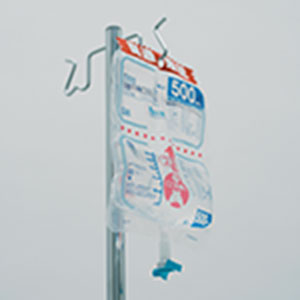“What if we could create a beverage to replenish lost sweat?” These words, spoken by Akihiko Otsuka, at that time the head of Otsuka Pharmaceutical's Tokushima Factory, launched the development of POCARI SWEAT. When you perspire, you reach for POCARI SWEAT. Today, this is a familiar scenario, but during the 1970s in Japan, the general wisdom was to avoid drinking anything, even water, during sports. What would a “beverage like sweat” consist of? What is sweat itself? From that day on, researchers in charge of development faced a monumental task.

Researchers began by reviewing internal materials related to the composition of human body fluids amassed during years of research as IV solution experts. They visited university medical schools and asked doctors for advice. They gathered their own sweat in the sauna and analyzed its composition. In addition to water, we lose ions, or electrolytes, such as sodium and potassium when we sweat. Replenishment of these electrolytes would be a vital purpose of a “beverage to replenish lost sweat.” Researchers focused on the osmotic pressure of body fluids. They discovered that to achieve similar osmotic pressure, sugar content should be kept at approximately half the level of juice, resulting in the first prototype for a “beverage to replenish lost sweat.

“It doesn't taste good.” The test product was quickly rejected. Magnesium, potassium and other ions have a bitter taste. Day after day, researchers tested different formulas in an effort to minimize this bitter taste. Before they knew it, more than 1,000 versions had been rejected. During this process, researchers focused on a combination of electrolytes and citrus juices. When the two were mixed, the bitter taste disappeared. Suddenly, the flavor hurdle had been cleared.
POCARI SWEAT was launched in 1980, but public reaction was far from favorable. It tastes bad. It's too thin. It will never sell…Sales staff were subjected to endless negative comments. But Otsuka employees had resolve. Even without exercise, people lose about 2.5 liters of water a day. When they perspire, they lose even more. Replenishment of water and electrolytes is important for daily health. To prove this concept, samplings were conducted at places where people were sweating: baseball games, track and field competitions, saunas and public baths, etc. Due to these efforts, POCARI SWEAT became a major hit the year following its debut and it remains a long-seller to this day.

At present, the dangers of “heat disorders” are common knowledge. In 1992, Otsuka cooperated with the Japan Amateur Sports Association (today's Japan Sport Association) to define the concept of heat disorders, develop countermeasures, and share information. Subsequently, in addition to sports, Otsuka has continued to provide information on heat adaptation, rehydration and other heat disorder countermeasures in workplaces, for the elderly and for children. In the world at large, many people live with the anxiety that comes from a lack of good quality water. Otsuka Pharmaceutical works with local employees to propose ways of replenishing water and electrolytes appropriate for regional customs and cultures. The “water of life,” made possible by the sweat and efforts of Otsuka employees, POCARI SWEAT will continue to support the health and wellbeing of people around the world.










